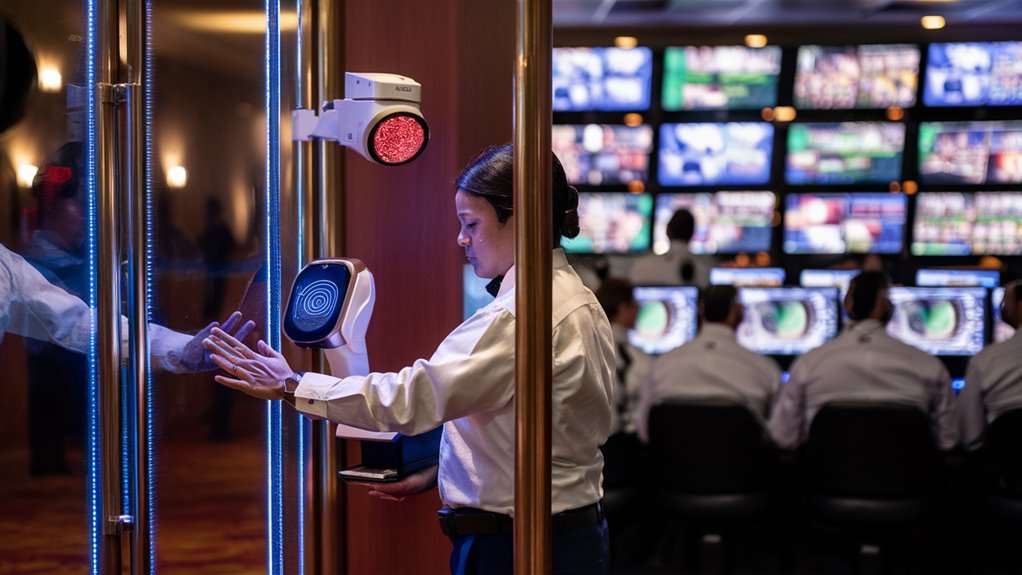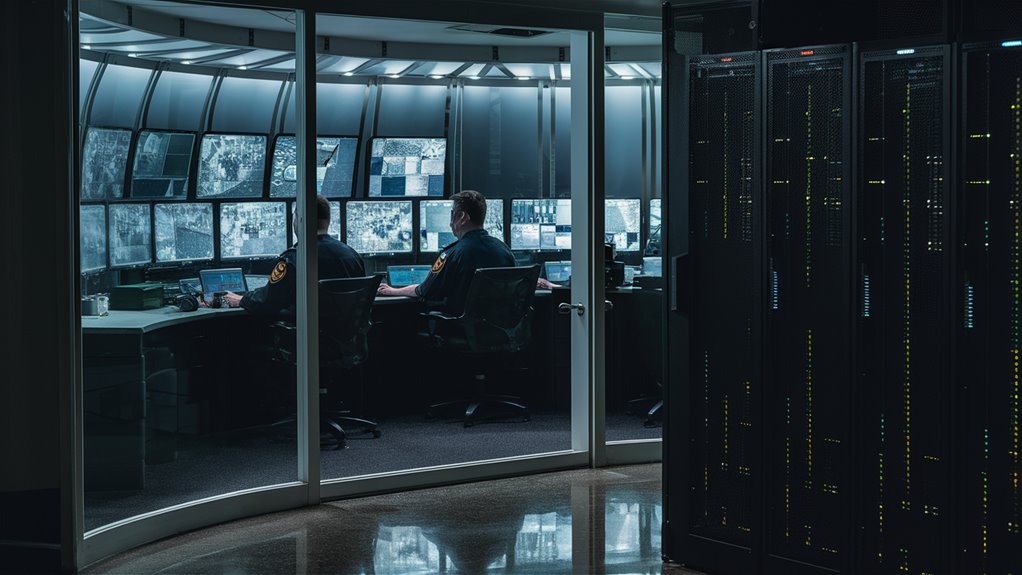How Casinos Keep Your Data Safe

Today’s casinos employ numerous safety measures to safeguard your data and funds. Around-the-clock camera systems with high-quality cameras monitor every part of the casino at all times.
Advanced Safety Tech
Smart technology and facial recognition tools play crucial roles in modern casino security. These systems collaborate with rapid data-check systems to identify risks and protect sensitive information immediately.
Protecting Money
Robust 256-bit encryption is essential for secure financial transactions. Casinos employ various payment methods and adhere to strict guidelines to ensure all monetary actions are protected.
Safety Steps in Place
Fingerprint recognition and metal detectors enhance security. Strong walls are strategically placed in key areas to bolster protection in sensitive zones. 먹튀검증 순위
Keeping Workers Safe
Casino personnel undergo extensive screening procedures and continuous security evaluations. These steps establish a barrier safeguarding customer data and casino assets.
Integrating these top-notch safety features creates a comprehensive security net that aligns with the highest standards of modern casino safety.
Physical Safety Setup
Casino Physical Safety Setup
Watching Closely
Modern casinos deploy advanced surveillance technology with high-definition camera networks covering all areas within the casino premises.
A dedicated security room operates continuously, managed by skilled personnel who oversee all activities.
Entry and Area Safety
Electronic access doors are crucial to casino security, employing card access for high-value areas and monitoring technology.
The central gaming area features:
- Metal detectors at entry points
- Reinforced walls near cash-handling zones
- Security personnel at strategic locations
Enhanced Security for Valuables
Vault protection involves top-tier security measures such as:
- Body screening procedures
- Intelligent motion sensors
- Fortified barriers
In emergency situations, rapid response plans are in place, providing swift communication with law enforcement.
Smart Area Layout
Security begins with thoughtful casino design featuring:
- Clear sightlines
- Strategically narrow pathways
- Efficient exit routes
- Monitored checkpoints
This layout enables security teams to effectively manage incidents while ensuring guest safety.
Digital Safety Locks and Data Keeping
Digital Safety in Gaming: Locks and Data Management
Strong Locking Methods
Modern gaming establishments implement robust digital security measures to safeguard sensitive data.
Advanced 256-bit encryption is employed to secure all data, providing a formidable barrier around player information and financial transactions.
Handling Data Safely
Data Protection
Secure data storage locations with smart access controls form the foundation of casino data management.
Role-based access protocols protect information, while physical screenings secure server areas.
These facilities feature optimal climate control and uninterruptable power systems.
Securing Financial Transactions
Token technology converts card information into secure tokens, avoiding the storage of card details on casino servers.
Systems comply with rigorous standards, undergoing regular security assessments and comprehensive audits.
Planning for Disasters and Data Preservation
Gaming venues utilize remote storage solutions with rapid data replication capabilities.
This advanced backup infrastructure ensures data integrity and availability during technological failures or major disasters. Multiple backup systems facilitate seamless data management across critical locations.
Adhering to Regulations and Standards
New casinos comply with stringent data protection regulations. Elements include:
- Comprehensive audits
- Secure communication protocols
- Regular security assessments
- Continuous testing
- Intelligent risk detection
These thorough security measures establish a resilient digital environment, safeguarding all data with meticulous attention.
Controls for Worker Access
Worker Access Controls in Modern Gaming

Multilayered Security System
Digital security frameworks and worker access protocols are essential to contemporary gaming security.
Casinos implement sophisticated multilayered access systems to regulate staff entry to specific areas, data repositories, and critical operational tools.
Each staff member is equipped with a unique security card, incorporating advanced safety features such as biometric checks integrated with smart card technology.
Access Permissions
Role-based access controls define clear security boundaries within casino operations.
Access permissions are strictly enforced according to job requirements—dealers cannot enter counting rooms, and slot technicians are barred from accessing financial data.
Each security tier demands distinct verification procedures, supported by managerial approvals and regular access updates. The system logs all access activities, including door entries, system logins, and security breaches.
Time-Based Access Restrictions
Time-based access controls constitute a vital security layer in casino operations.
Employee access cards are disabled outside working hours, while time-limited access permissions expire after predefined durations.
These measures integrate with real-time monitoring systems to identify unauthorized access attempts or suspicious activities. Coupled with comprehensive security training and thorough background checks, this architecture forms a robust defensive grid against internal threats while maintaining operational efficiency.
Key Security Features:
- Biometric authentication systems
- Smart card verification
- Role-specific access restrictions
- Automated time restrictions
- Real-time monitoring capabilities
- Comprehensive access logs
Security Measures for Financial Transactions
Transaction Security in Modern Gaming
Pinnacle of Security Standards
State-of-the-art payment security systems safeguard vast volumes of daily casino transactions through comprehensive multilayered protection.
Advanced encryption methods protect card information, fund transfers, and digital wallet activities with cutting-edge security measures including comprehensive encryption, tokenization, and rapid fraud detection systems.
Regulatory and Protection Standards
Payment systems compliant with PCI DSS meet the highest international security standards at every transaction point.
Gaming venues employ anti-skimming technology on card terminals and ATMs, with routine inspections to prevent tampering.
Physical security protocols bolster protection for significant financial transactions, establishing robust barriers against fraud.
Network Security Infrastructure
Distinct payment channels operate on isolated systems, creating robust networks.
Payment processors maintain continuous EMV compliance while employing chip technology standards across all platforms.
Regular security assessments identify and address potential vulnerabilities, ensuring data security throughout the transaction process.
Key Security Features
- Comprehensive encryption of all transactions
- Real-time monitoring and fraud detection systems
- Physical security screenings for large transfers
- Anti-skimming protections on all payment devices
- Regular compliance audits and updates
- Independent payment system channels
- EMV chip technology adoption
- Tokenization of critical financial information
Monitoring and Surveillance Systems
Advanced Casino Monitoring and Security Systems
State-of-the-Art Surveillance Infrastructure
Comprehensive monitoring systems form the foundation of modern casino security operations, featuring sophisticated surveillance setups and strategically positioned cameras.
High-definition cameras provide clear views of gaming tables, slot machines, and public areas.
Security control rooms operate continuously, staffed by certified security professionals.
AI-Enhanced Security Capabilities
Advanced AI and facial recognition technologies revolutionize casino security by providing rapid risk assessments and behavior analysis.
New surveillance systems utilize intelligent algorithms to detect card counting behaviors, monitor betting patterns, and automatically identify unusual activities.
Responsive data analysis tools enable swift security responses, preventing potential issues from escalating.
Digital Recording and Compliance
Central digital systems facilitate comprehensive recording and storage solutions for casino monitoring activities.
Multi-angle footage meticulously captures every gaming interaction, incident, and financial transaction.
Compliance regulations require retaining recordings for at least 30 days, with some jurisdictions mandating longer periods for legal and anti-fraud purposes.
Key Security Features
- High-definition surveillance coverage
- Real-time monitoring capabilities
- Advanced facial recognition systems
- Automated risk detection
- Secure digital storage solutions
- Multilayered compliance mechanisms
Network Defense Setup
Network Security for Physical Safety Systems
Comprehensive Security Architecture
Physical security systems require sophisticated network defense architectures to protect vital monitoring data and gaming operations.
Advanced firewalls and intrusion detection systems offer round-the-clock network monitoring, essential for contemporary security setups.
Network Segmentation
Network segmentation through VLAN implementation creates distinct operational zones, effectively isolating gaming systems from surveillance, financial, and public areas.
Encrypted VPN protocols ensure secure remote access, while multifactor authentication systems maintain stringent access controls. Online Slot Machines
Real-time security logs and automated threat response tools offer rapid threat detection and mitigation.
Robust Configuration Protection
Backup system configurations with recovery options ensure continuity in critical security areas.
Routine security assessments and penetration testing methodologies proactively address potential vulnerabilities.
Data center security employs advanced access controls and comprehensive emergency plans to counter both cyber and physical threats.
Key Security Features
- Continuous network monitoring
- Advanced firewall systems
- Encrypted communication channels
- Multifactor authentication
- Real-time threat detection
- Automated response systems
- Comprehensive emergency planning
